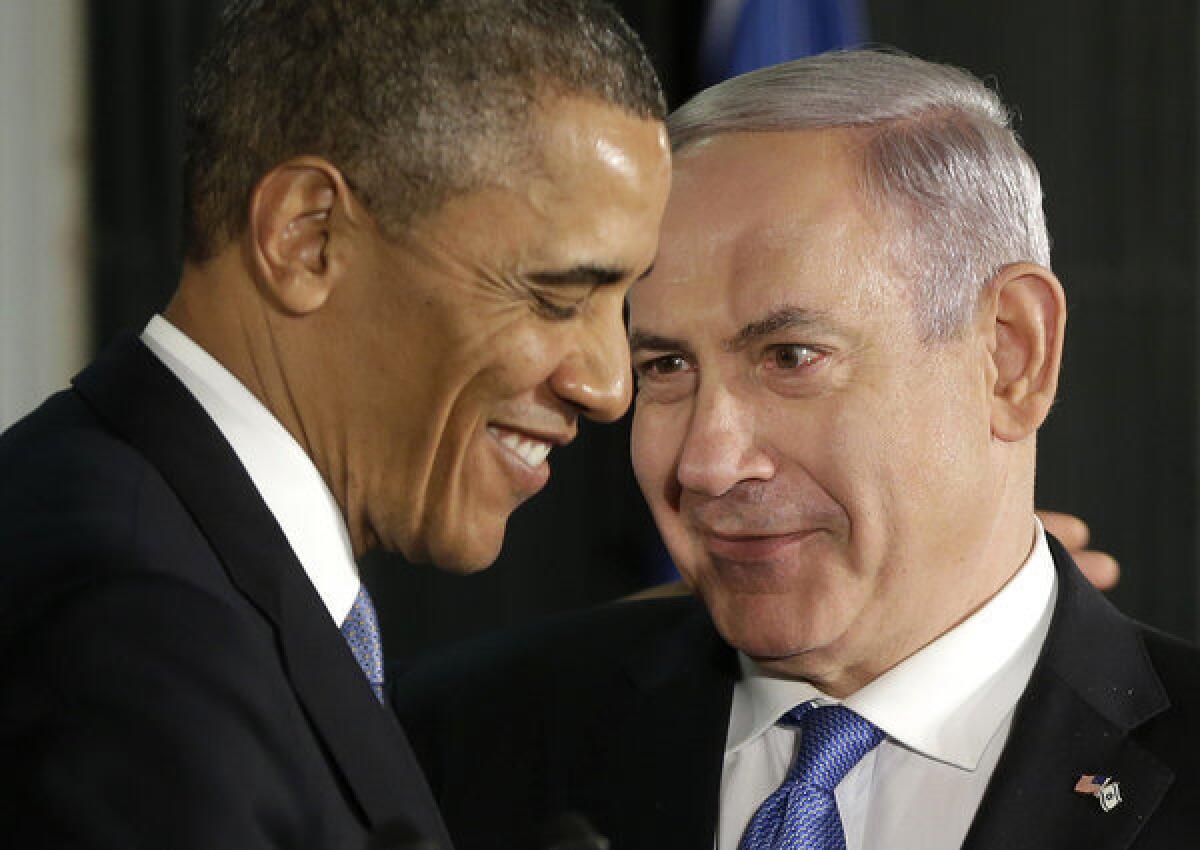Obama, Netanyahu speak of bonds but disagree on Iran

WASHINGTON — President Obama and Israeli Prime Minister Benjamin Netanyahu on Wednesday affirmed the “extraordinary bonds” between their nations even as they also exposed again their differences on how soon Iran might pose a nuclear threat.
Appearing at news conference on the first day of Obama’s symbolism-laden first visit to Israel as president, the two leaders vowed to collaborate closely on a full range of challenges roiling the Mideast region, from Syria and Egypt to the stalled Arab-Israeli peace effort.
Yet though the visit is aimed at improving the sometimes fraught relations between them, the leaders made it clear that they have different assessments of Iran’s nuclear program, which both governments fear — despite Tehran’s denials — is aimed at developing a weapon.
Netanyahu said that although Obama’s view is that it would take Iran about a year to build a bomb once it decided to take that step, the important date to take into consideration is when Iran secures enough uranium for a weapon because then it reaches an “immunity zone.”
“Whatever time is left, there’s not a lot of time,” Netanyahu emphasized in the 45-minute news conference at his home.
He also pointed out that diplomacy and sanctions — Obama’s preferred method of resolving the issue — “so far have not stopped Iran’s nuclear program.” And he called on Obama, who has been reluctant to threaten Tehran too loudly, to augment diplomacy and sanctions with “clear and credible threat of military action.”
Obama’s two-day stop in Israel is aimed at convincing the Israeli public that he is fully committed to their security. He signed Netanyahu’s guest book citing the “extraordinary bonds” between the two longtime allies.
He pointed out that his administration has sharply increased American commitment to Israeli security, noting that the United States will provide $200 million this year for the Israeli-built Iron Dome missile defense system, in addition to the usual $3 billion in aid to the country.
Netanyahu, who has had a sometimes-contentious relationship with Obama, seemed to be trying to pitch in to help convince the Israeli public that Obama was a friend.
“I think people should get to know President Obama the way I’ve gotten to know him,” he said.
Obama signaled that he did not yet fully agree with Israel’s assessment that Syrian President Bashar Assad’s military has used chemical weapons against its population. Though there have been reports this week that the regime has used chemical weapons in small amounts in two locations, Obama said U.S. officials are still studying the issue.
Obama said that his administration views use of such weapons as a “game-changer,” but he added that “having the facts before you act is very important.”
Though Obama has sought to lower expectations before the trip that he was coming to renew his push for Israeli-Palestinian peace talks, he made it clear that he is taking a new look at how to help restart an effort that stalled two years ago.
“We’ll continue to look for steps that both Israelis and Palestinians can take to build trust and confidence, upon which lasting peace will depend,” he said.
And though Netanyahu’s government has been viewed as unenthusiastic about a new peace push, the prime minister insisted that he is ready to plunge in again.
“Israel remains fully committed to peace and to the solution of two states for two peoples,” he said. “We extend our hands in peace and friendship to the Palestinian people.... Let us sit down at the negotiating table.”
ALSO:
South Korean banks, others hit by cyber attack
Obama in Israel: ‘Peace must come to the Holy Land’
Al Qaeda group claims to have beheaded a French hostage
More to Read
Start your day right
Sign up for Essential California for news, features and recommendations from the L.A. Times and beyond in your inbox six days a week.
You may occasionally receive promotional content from the Los Angeles Times.







